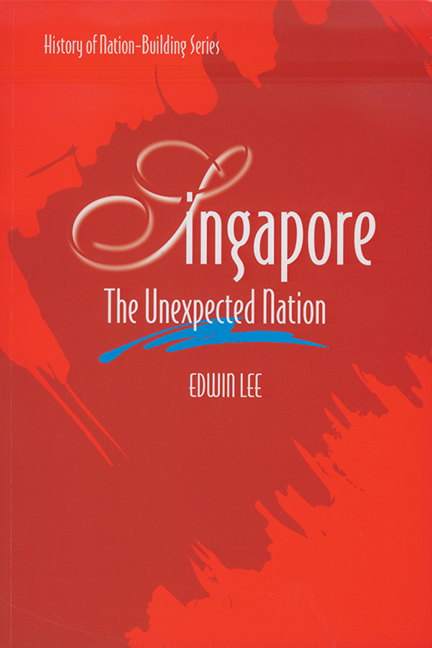Book contents
- Frontmatter
- Dedication
- Contents
- Preface
- Introduction by Wang Gungwu
- Chapter One Beginnings: From Temasek to Singapore
- Chapter Two Race, History and Nationalism
- Chapter Three Contestants and Contesting Visions
- Chapter Four The Accidental Chief Minister
- Chapter Five The Terminal Chief Minister
- Chapter Six The Embattled Prime Minister
- Chapter Seven Merger: Contesting Ownership and Principles
- Chapter Eight Terms of Disendearment
- Chapter Nine Dare to be Equal
- Chapter Ten The Way to Survive
- Chapter Eleven National Service: The Price of Independence
- Chapter Twelve Politics of Education
- Chapter Thirteen Home Ownership, National Stability and the New Middle Classes
- Chapter Fourteen University and Nation
- Chapter Fifteen Toh's Nation-Building Thrust
- Chapter Sixteen Nantah: Between Community and Nation
- Chapter Seventeen Self-Renewal: Talents for a Tough Act
- Chapter Eighteen The Consensual Prime Minister
- Chapter Nineteen Confucianism, Christianity, Chineseness
- Chapter Twenty Singapore Dreams, Singapore Dilemmas
- Chapter Twenty-One The Hyphenated Singaporean
- Chapter Twenty-Two The Unexpected Nation
- Bibliographical Note
- Index
- The Author
Chapter Nineteen - Confucianism, Christianity, Chineseness
Published online by Cambridge University Press: 21 October 2015
- Frontmatter
- Dedication
- Contents
- Preface
- Introduction by Wang Gungwu
- Chapter One Beginnings: From Temasek to Singapore
- Chapter Two Race, History and Nationalism
- Chapter Three Contestants and Contesting Visions
- Chapter Four The Accidental Chief Minister
- Chapter Five The Terminal Chief Minister
- Chapter Six The Embattled Prime Minister
- Chapter Seven Merger: Contesting Ownership and Principles
- Chapter Eight Terms of Disendearment
- Chapter Nine Dare to be Equal
- Chapter Ten The Way to Survive
- Chapter Eleven National Service: The Price of Independence
- Chapter Twelve Politics of Education
- Chapter Thirteen Home Ownership, National Stability and the New Middle Classes
- Chapter Fourteen University and Nation
- Chapter Fifteen Toh's Nation-Building Thrust
- Chapter Sixteen Nantah: Between Community and Nation
- Chapter Seventeen Self-Renewal: Talents for a Tough Act
- Chapter Eighteen The Consensual Prime Minister
- Chapter Nineteen Confucianism, Christianity, Chineseness
- Chapter Twenty Singapore Dreams, Singapore Dilemmas
- Chapter Twenty-One The Hyphenated Singaporean
- Chapter Twenty-Two The Unexpected Nation
- Bibliographical Note
- Index
- The Author
Summary
This chapter deals with the consequences of success at the level of philosophy, ethics, and moral values. The gearing of the education system to the objective of rapid economic growth inevitably affected the mind and spirit of Singaporeans. The traditional Chinese-medium schools, were, with certain exceptions, gone. They taught the importance of scholastic achievements and hard work, and of respect for the family and the community. In contrast, in an English-medium school, it was considered “uncool” to be so didactic. The shift in enrolment from Chinese-medium schools to English-medium schools, such that by 1987 all schools were English-medium (i.e., using English as the first language), meant that, increasingly, there was a moral gap in the education of Singaporeans. Add to this the growing affluence, with more and more people able to realize the middle-class dream, and the conditions were ripe for a “cult of materialism” to flourish as it, in fact, did, in all its manifold excesses.
Another dubious fruit of the dominance of English in the education system, and as a working language, was the incorporation of Singaporeans as readers and viewers of the newspapers, magazines, films, and television shows produced by the West. This, in the sixties and seventies, exposed them to the youth culture of protest, sex, and drugs erupting in the West at a time when Singapore was taking off into prosperity.
The PAP Government was faced with a situation which had arisen out of the very success for which it had worked. Normally, an industrial society with an affluent middle class may be expected to be a liberal democracy. But the PAP Government believed that Singapore had to be different. It wanted to speed up economic growth with Western technology which it admired unreservedly, but to go slow with adopting Western liberal democracy, which it was sceptical of and distrusted.
What it attempted to do was a mix and match of Western technology and East Asian values. Confucian philosophy was held to be a treasury of the desired East Asian values. However, selectivity and discretion were also exercised here. Aspects of Confucianism were drawn on as needed, depending on how the situation shaped up.
- Type
- Chapter
- Information
- SingaporeThe Unexpected Nation, pp. 533 - 558Publisher: ISEAS–Yusof Ishak InstitutePrint publication year: 2008

